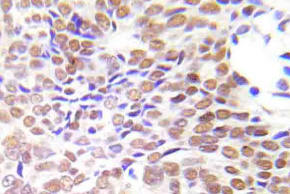HDAC1 Rabbit Polyclonal Antibody
Other products for "HDAC1"
Specifications
| Product Data | |
| Applications | IHC |
| Recommended Dilution | Immunohistochemistry on paraffin sections: 1/50 - 1/200. |
| Reactivities | Human, Mouse, Rat |
| Host | Rabbit |
| Clonality | Polyclonal |
| Specificity | This antibody detects endogenous levels of HDAC1 protein. (region surrounding Glu427) |
| Formulation | Phosphate buffered saline (PBS), pH 7.2. State: Aff - Purified State: Liquid purified Ig fraction Preservative: 0.05% sodium azide |
| Concentration | 1.0 mg/ml |
| Purification | Affinity chromatography (> 95% (by SDS-PAGE) |
| Conjugation | Unconjugated |
| Storage | Store undiluted at 2-8°C for one month or (in aliquots) at -20°C for longer. Avoid repeated freezing and thawing. |
| Stability | Shelf life: one year from despatch. |
| Predicted Protein Size | ~ 55 kDa |
| Gene Name | Homo sapiens histone deacetylase 1 (HDAC1) |
| Database Link | |
| Background | In the intact cell, DNA closely associates with histones and other nuclear proteins to form chromatin. The remodeling of chromatin is believed to be a critical component of transcriptional regulation and a major source of this remodeling is brought about by the acetylation of nucleosomal histones. Acetylation of lysine residues in the amino-terminal tail domain of histone results in an allosteric change in the nucleosomal conformation and an increased accessibility to transcription factors by DNA. Conversely, the deacetylation of histones is associated with transcriptional silencing. Several mammalian proteins have been identified as nuclear histone acetylases, including GCN5, PCAF (for p300/CBP-associated factor), p300/CBP and the TFIID subunit TAF II p250. Mammalian HDAC1 (also designated HD1), HDAC2 (also designated mammalian RPD3) and HDAC3, all of which are related to the yeast transcriptional regulator Rpd3p, have been identified as histone deacetylases. |
| Synonyms | Histone deacetylase 1, HD1, RPD3L1 |
| Reference Data | |
| Protein Families | Adult stem cells, Druggable Genome, Stem cell - Pluripotency, Stem cell relevant signaling - DSL/Notch pathway, Transcription Factors |
| Protein Pathways | Cell cycle, Chronic myeloid leukemia, Huntington's disease, Notch signaling pathway, Pathways in cancer |
Documents
| Product Manuals |
| FAQs |
| SDS |
{0} Product Review(s)
0 Product Review(s)
Submit review
Be the first one to submit a review
Product Citations
*Delivery time may vary from web posted schedule. Occasional delays may occur due to unforeseen
complexities in the preparation of your product. International customers may expect an additional 1-2 weeks
in shipping.






























































































































































































































































 Germany
Germany
 Japan
Japan
 United Kingdom
United Kingdom
 China
China



